Are You an Ally?
Click HereUnity Zone at Norco College
Learn More- Home
- Student Services
- Special Funded Programs
- Unity Zone
LGBTQIA+ & Undocumented Services
Students, staff, faculty, and families can book their appointments online with our legal team (TODEC).
The Unity Zone at Norco College
Our Mission
Unity Zone supports holistic success (academic, personal, and professional), creates equitable opportunities for educational and community resources, scholarships, and fosters safe/brave spaces for undocumented students, AB 540, mixed-status household families, LGBTQIA+, and allies at Norco College.
“A place where we can dream, love, unite, and be proud of who we are."
Hours & Location
Monday: 8:00 am - 4:30 pm
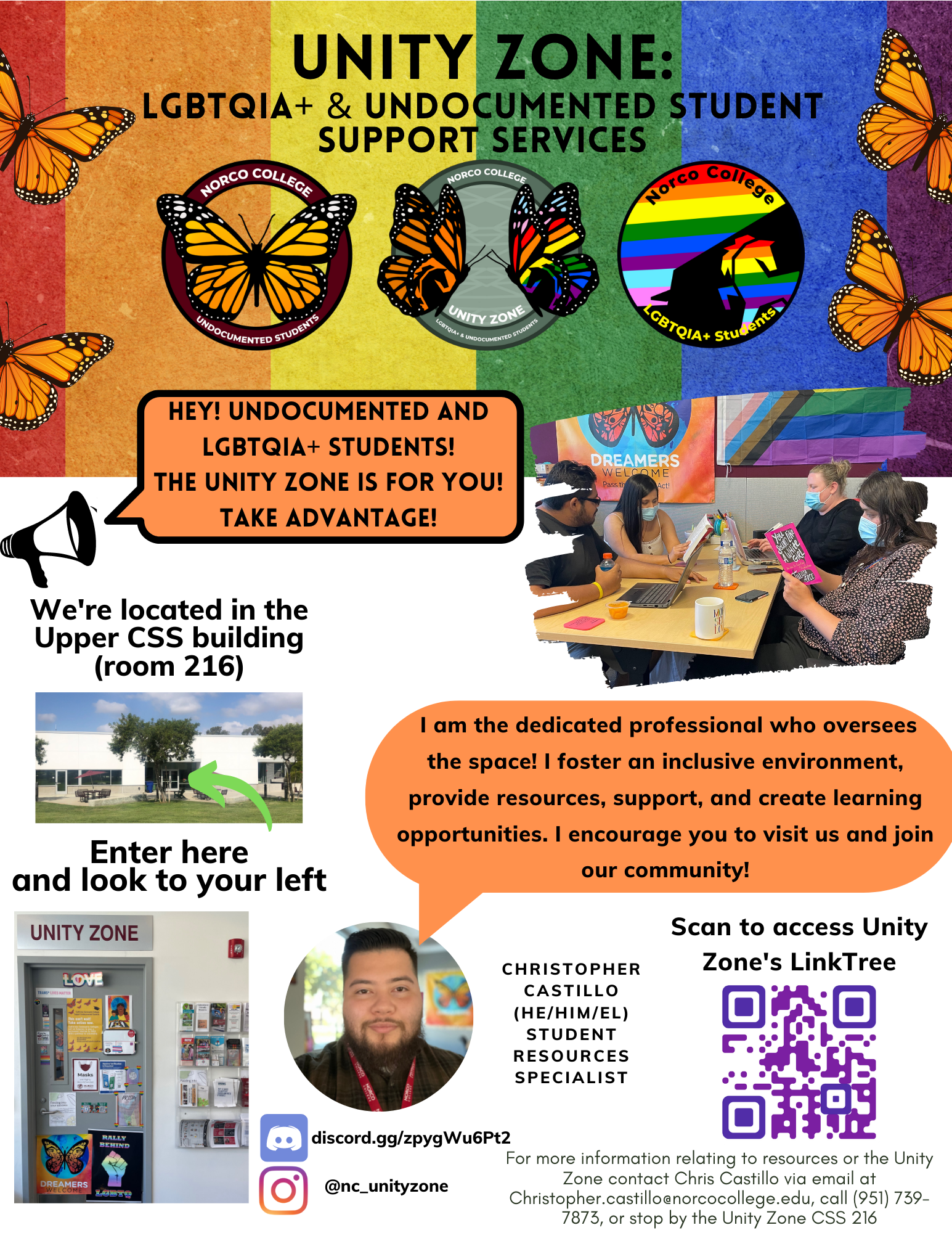
Meet the Staff
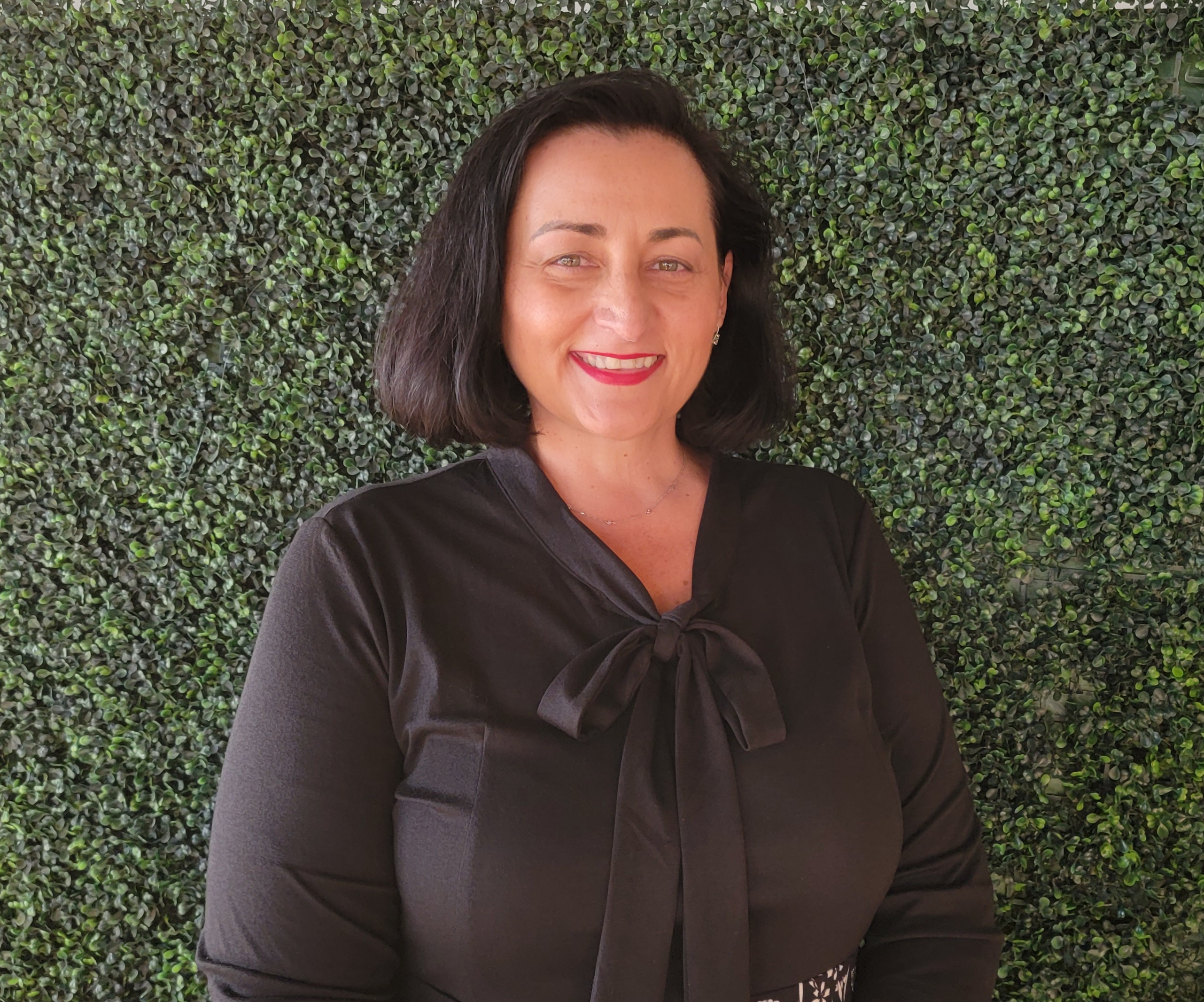
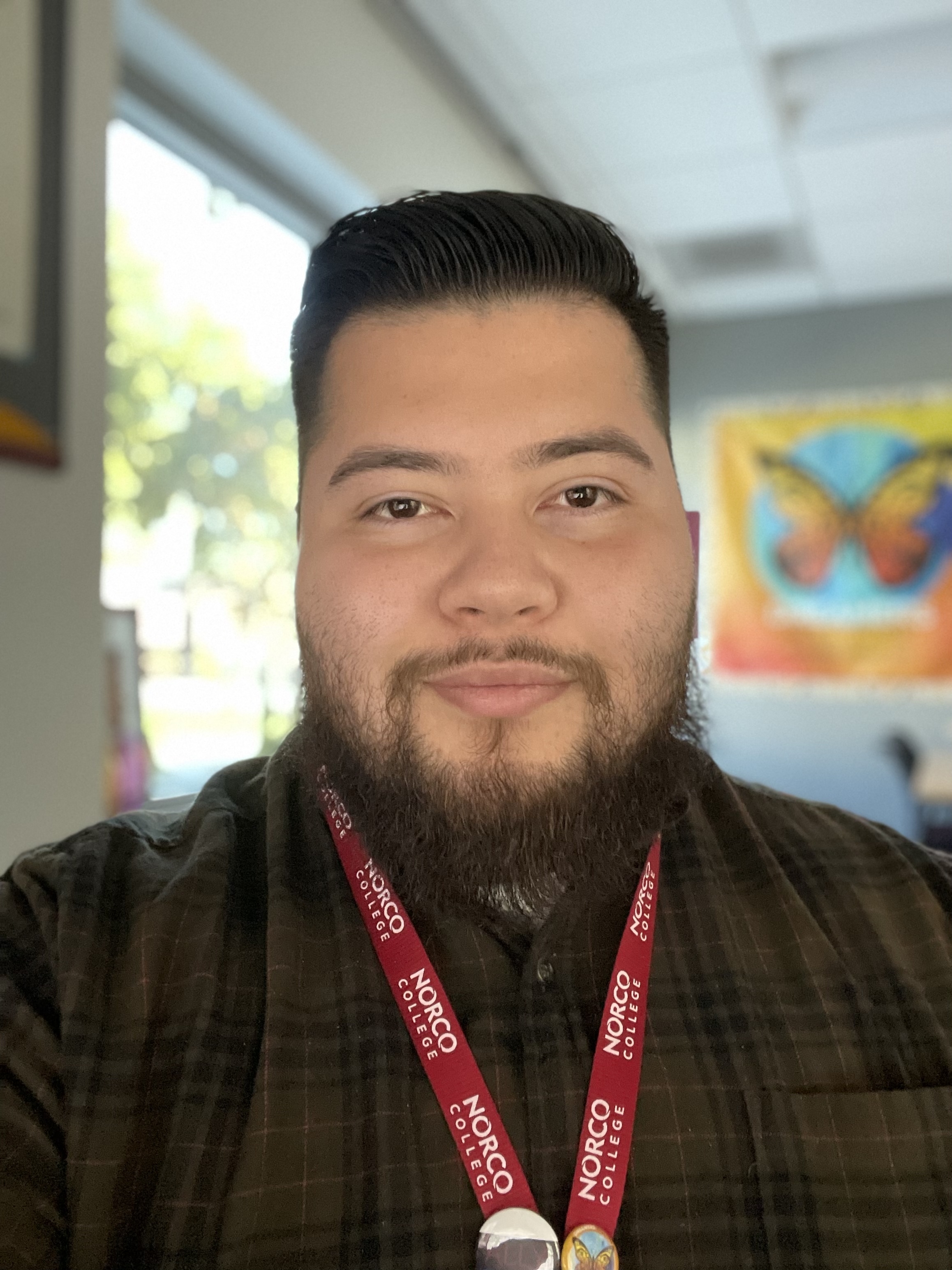

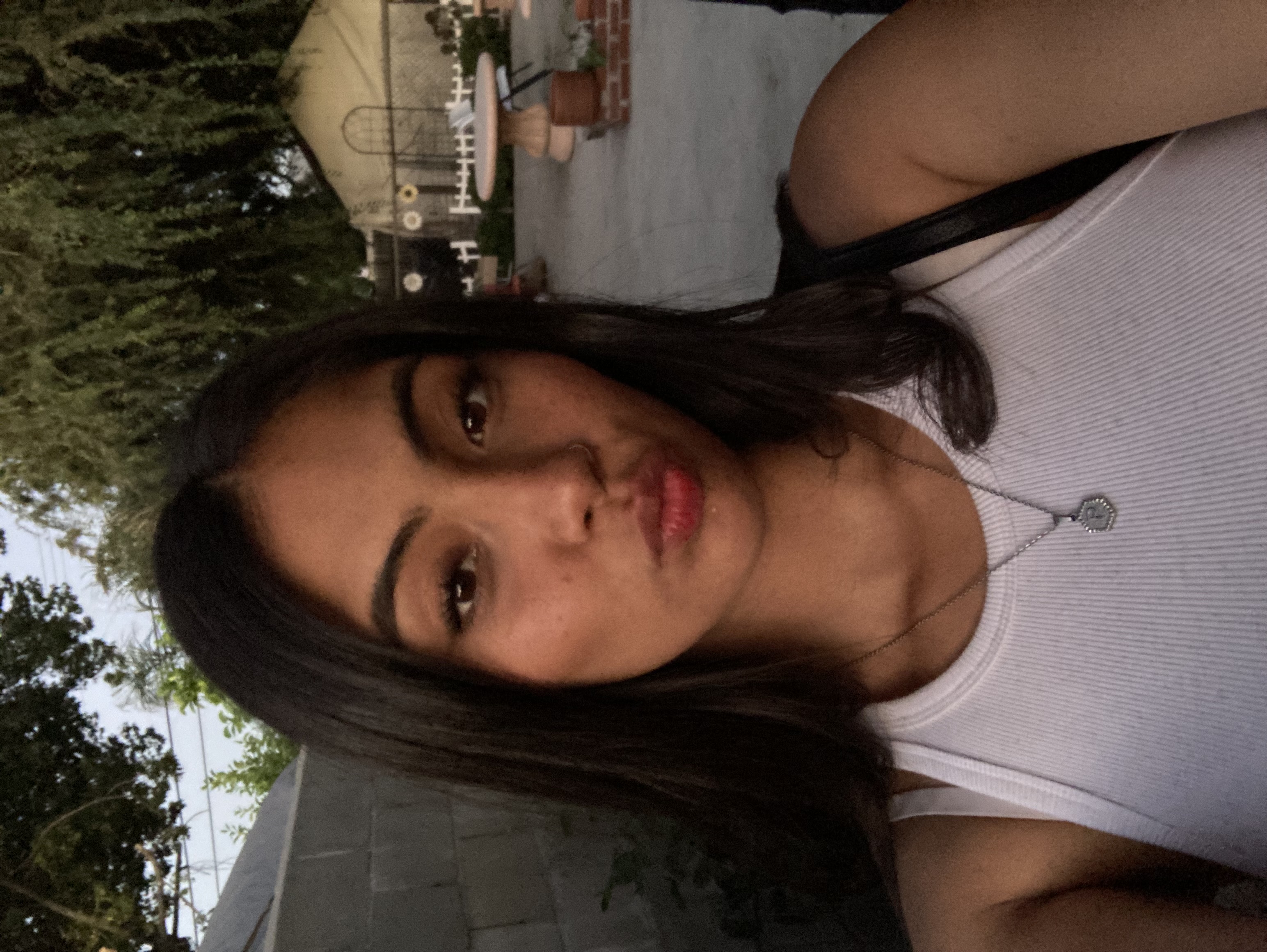

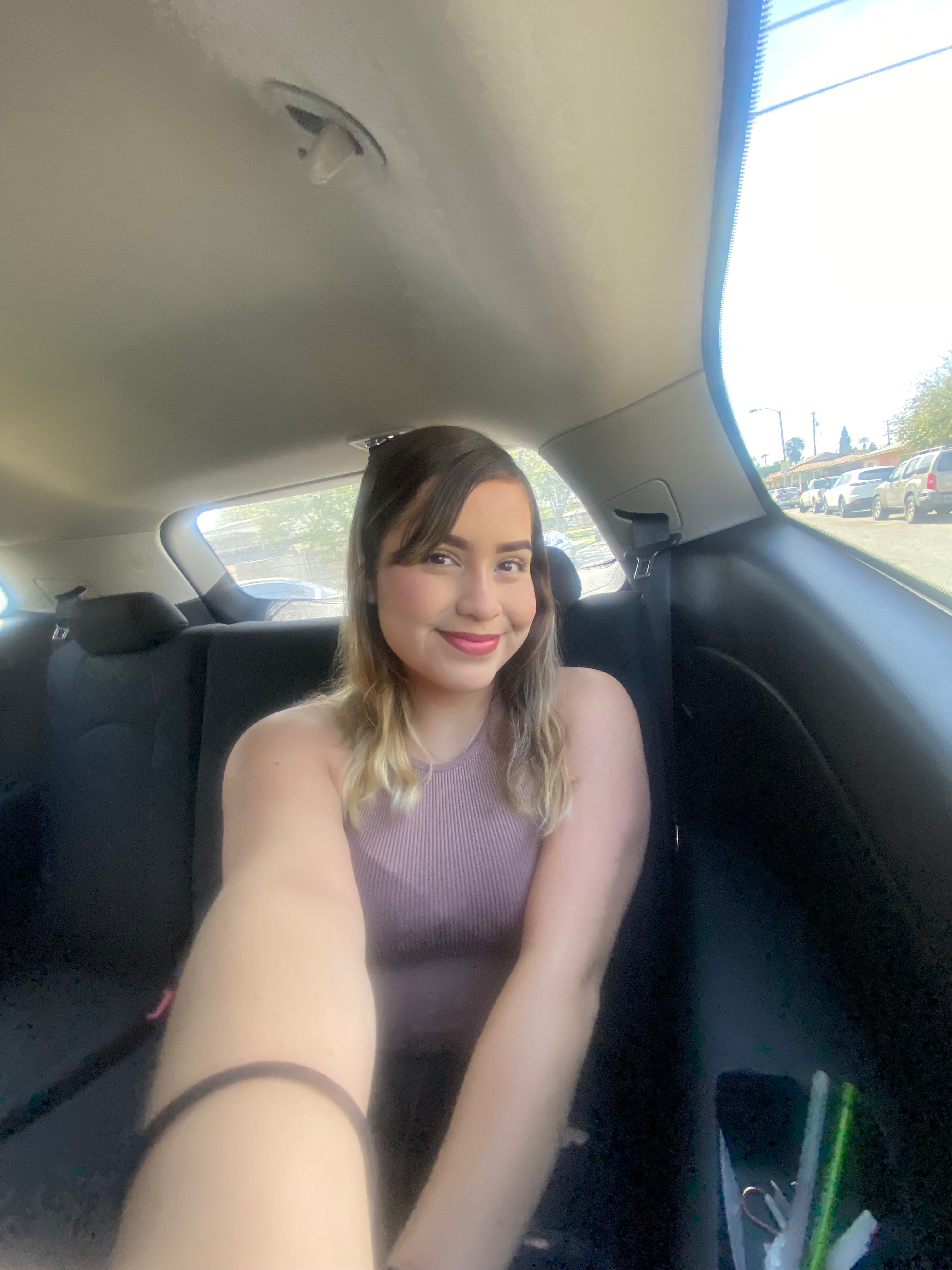
LGBTQIA+ Resources
The Unity Zone serves as the primary hub of resources, services, and events for LGBTQIA+
students on campus. We work with both on-campus and local community members to provide
workshops and events to promote success.
On-Campus Resources
- Norco College Name Change Form
- Gender Neurtal Restroom Locations
- Student Health & Psychological Services (homepage) OR (RCCD Health Services Portal)
- Laptop Loan Program, Visit the Unity Zone for more details
- Basic Needs & Wellness Schedule an Appointment Link
Annual Events
- Paint with Pride (Fall & Spring Terms)
- Lavender Celebration (Spring Term)
- Finals Frenzy (Fall & Spring Terms)
- LGBTQ+ Speaker Series (Spring Term)
Off-Campus Resources
- Temporary Housing
- LA County Resources Search Engine:211
- Safe Zone Awareness Project
- Pride Counseling Search Engine
- Video/Film Recommendations
- 30 LGBTQ Scholarships for Higher Education
- Diagram of Sex, Gender & Sexuality
- Ideas for Allies of the Transgender & Intersex Communities
- LGBT Books
- LGBT Resources in the Riverside & San Bernardino Areas
- LGBT Resource List
- LGBTQ Workplace Resource Guide
- LGBTQIA+ Safe Zone Project Resource Guide: A Community Manual for Local & National Queer Resources
- Scenarios..."Who May Knock of Your Door?"
- Terminology
- Transgender Resources
- Ways to be an ALLY to non-monosexual/bi people
- "What Can I Do?" - ideas for Allies
- When a Friend "Comes Out" to You
- Zippia Trans Job Seeker Guide
- Financial Planning for Gender Confirmation Surgery
- Financial and Social Resources for Homeless LGBTQ+ Youth
- Information on Updating Your Birth Certificate
- LGBTQ+ Family Planning Finance Guide
- Comprehensive LGBTQ+ Health Guide
Trans Lifeline
If you or somebody you know is in need of Trans support, you may reach out to the
Transgender suicide hotline by reaching
TRANS LIFELINE at (877)-565-8860
The Trevor Project
If you or somebody you know is a young person in crisis, feeling suicidal, or in need
of a safe judgement-free place to talk you may also reach
The Trevor Project's hotline at (866) 488-7386
Legal Services: Training Occupational Development Educating Communities (TODEC)
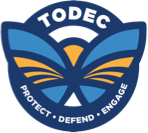
Community College Immigration Legal Services program is to provide free immigration legal services, including education and outreach services, to students, staff, and faculty on California community college campuses statewide.
Attorneys and paralegals are available to assist students with general consultations, DACA renewals, and general assistance in filling out forms such as family-based petitions. Priority will be given to undocumented students, staff, and faculty.
The State of California’s 2018-19 Budget provided an initial $10 million investment for the California Department of Social Services (CDSS) to administer and implement immigration legal services at California community colleges. The initial investment allowed CDSS to fund nine legal service providers to serve 65 colleges. The 2020-21 provided $10 million to expand the program over the next year. CDSS is partnering with the California Community Colleges Chancellor’s Office and the Foundation for California Community Colleges to ensure students, staff, and faculty at these colleges can access free immigration legal services.
Training Occupational Development Educating Communities
Basic immigration legal assistance includes:
- Legal Consultations to Screen for Immigration Relief
- Deferred Action for Childhood Arrivals (DACA) Renewals
- Family-based petitions
- Naturalization/Citizenship applications
Education and Outreach activities (e.g. webinars) cover topics such as:
- Avoiding fraudulent legal services
- Know Your Rights Presentations (KYR)
- Family Preparedness/Childcare Safety Plans
- Public Charge information
Services not currently funded (referrals may be provided):
- Removal Defense
- Asylum Applications
Terminology
LGBTQ+
Sexual Identity
Asexual – Person who is not sexually attracted to anyone or does not have a sexual orientation.
Bisexual – A person emotionally, physically, and/or sexually attracted to males/men and females/women
and/or multiple genders. This attraction does not have to be equally split between
genders and there may be a preference for one gender over others.
Gay – 1. Term used in some cultural settings to represent males who are attracted to
males in a romantic, erotic and/or emotional sense. Not all men who engage in “homosexual
behavior” identify as gay, and as such this label should be used with caution. 2.
Term used to refer to the LGBTQI community as a whole, or as an individual identity
label for anyone who does not identify as heterosexual.
Heterosexual/Straight - (of a person) sexually attracted to people of the opposite sex.
Lesbian - Term used to describe female-identified people attracted romantically, erotically,
and/or emotionally to other female-identified people.
Pansexual – A person who is sexually attracted to all or many gender expressions.
Queer – 1. An umbrella term which embraces a matrix of sexual orientations, and habits
of the not-exclusively- heterosexual-and-monogamous majority. Queer includes lesbians,
gay men, bisexuals, trans people, intersex persons, the radical sex communities, and
many other sexually transgressive (underworld) explorers. 2. This term is sometimes
used as a sexual orientation label instead of ‘bisexual’ as a way of acknowledging
that there are more than two genders to be attracted to, or as a way of stating a
non-heterosexual orientation without having to state who they are attracted to.
Gender Expression
Androgynous - combination of masculine and feminine characteristics and/or indistinguishable
gender expression
Fem/Femme/Feminine/Fem of Center - set of attributes, society's expectations behavior that are typically associated
with women or girls
Gender Non-Conforming - refers to people who do not follow other society's ideals or stereotypes about
how they should look or act based on the sex assigned at birth.
Gender Conforming - refers to people who do follow society's ideals or about how they should look or
act based on the sex assigned at birth.
Masc/Masculine/Masculine of Center - set of attributes, society's expectations behavior that are typically associated
with men or boys
Gender Identity
Gender Non-Conforming - refers to people who do not follow other people's ideas or stereotypes about how
they should look or act based on the female or male sex they were assigned at birth.
Gender Neutral - cannot be referred to as one gender or another
Genderqueer - denoting or relating to a person who does not subscribe to conventional gender
distinctions but identifies with neither, both, or a combination of male and female
genders.
Non Binary - someone that does not exclusively identify as a man or a woman, can include a variation
of gender expression
Transgender - when a person perceives themselves and/or feels a different gender identity that
differs from what they were assigned at birth and/or by society
Trans man - a transgender person who was assigned female at birth but whose gender identity
is that of a man
Trans woman - a transgender person who was assigned male at birth but whose gender identity is
that of a woman
Undocumented
Undocumented AB 540 (2001): allows qualifying nonresident students to pay in-state tuition at public universities
Asylum Seeker: a person who has left their home country as a political refugee and is seeking asylum
in another. Only asylum seekers who are granted refugee status are allowed to work
in the country.
The CALIFORNIA DREAM ACT (2011): allows AB 540 students to also apply for aid, known as Cal Grants, and non-state
funded scholarships.
Citizen: Individuals who obtain U.S. citizenship by birth in the U.S. or by process of naturalization.
Citizens obtain a Social Security Number.
DACAmented: The term is used by some undocumented individuals who have received DACA. DACAmented
(similar to DREAMer) is sometimes used as a way to navigate away from the negative
connotations given to terms such as undocumented, immigrant, non-U.S. citizen and
so forth.
Deferred Action for Childhood Arrivals (DACA): DACA is program announced on June 12, 2012 by President Barack Obama that is to protect
individuals who qualify from deportation and give them a work permit for 2 years.
The program is renewable. Deferred Action does not provide lawful status.
DREAM Act: The Development Relief and Education for Alien Minors (DREAM) Act is a piece of legislation
proposed to provide a pathway to permanent residency and U.S. citizenship for qualified
undocumented immigrant students. The DREAM Act has been proposed several times in
Congress since 2001, but has not been approved.
DREAMer: DREAMer refers to students who are undocumented and are also part of the DREAM Act
movement. DREAMer is a term commonly used by students who connect with the DREAM Act
movement, and sometimes used as a way to navigate away from the negative connotations
given to terms such as undocumented, immigrant, non-U.S. citizen and so forth.
Dropping The I-Word: "Illegals" is a racially charged slur used to dehumanize and discriminate against
immigrants and people of color regardless of migratory status. The I-word is shorthand
for "illegal alien," "illegal immigrant" and other harmful terms. The Applied Research
Center (ARC) and Colorlines.com, have presented the Drop The I-Word campaign to eradicate
the slur "illegals" from everyday use and public discourse.
F-Visa: It is a type of visa issued to students who are not from the United States but who
are attending an academic program or English language program at a U.S. college or
university. These students are required to maintain a full-time course load for the
entirety of their approved stay.
Generation 1.5: Refers to immigrants who were brought to the U.S as young children and identify as
American. The label comes from the groups’ special place as first generation Americans
who migrate to this country during childhood and feel strong identification with the
U.S., yet are native to another country.
International Student: Most colleges and universities consider any student who currently holds a visa of
any type or is seeking a visa to be international. Undocumented students are not viewed
as international applicants because many do not qualify for a visa, in addition undocumented
students should not have to go through the international admission process as they
cannot provide an international student visa.
Legal Permanent Resident (LPR): or “green card” recipient is defined by immigration law as a person who has been
granted lawful permanent residence in the U.S. Mixed Status Family- Refers to students
that are either: 1) undocumented, but have family members that are U.S. residents
or U.S. citizens or 2) are U.S. residents or U.S. citizens but have family members
that are undocumented. Mixed Status Family- Refers to students that are either: 1)
undocumented, but have family members that are U.S. residents or U.S. citizens or
2) are U.S. residents or U.S. citizens but have family members that are undocumented.
MIXED STATUS FAMILIES: families with at least one undocumented family member and at least one member who
is a U.S. citizen. Over one-third of U.S. households with an undocumented person are
mixed families.
Naturalization: The process by which U.S. citizenship is conferred upon a lawful permanent resident
after he or she fulfills the requirements established by Congress in the Immigration
and Nationality Act (INA). The general requirements for administrative naturalization
include: a period of continuous residence and physical presence in the United States;
an ability to read, write, and speak English; a knowledge and understanding of U.S.
history and government; good moral character; attachment to the principles of the
U.S. Constitution; and a favorable disposition toward the U.S.
Non-Citizen: The non-citizen category applies to people born outside of the U.S. and who have
not applied for or have been granted citizenship. Permanent residents also fall into
this category.
Overstayed Visa: Refers to individuals who have stayed in the U.S. after their tourist, visitor, or
student visa has expired and thus they become undocumented by overstaying their visa.
Refugee- is a person who has been forced to leave their country in order to escape
war, persecution, or natural disaster.
Refugee: is a person who has been forced to leave their country in order to escape war, persecution,
or natural disaster.
SANCTUARY SCHOOLS & CAMPUSES: educational institutions that adopt policies to protect students who are undocumented.
Temporary Protected Status (TPS): is a temporary immigration status granted to nationals of certain countries who are
already in the U.S.
T-Visa: T Nonimmigrant Status (T visa) is a set aside for individuals who are or have been
victims of human trafficking. It protects victims of human trafficking and allows
victims to remain in the United States to assist in an investigation or prosecution
of human trafficking.
UNACCOMPANIED MINORS: undocumented children who enter the U.S. without a guardian. They often come to escape
violence in their country of origin.
Undocumented: Undocumented refers to people who are not U.S. citizens or Permanent Residents of
the United States, who do not hold a visa to reside in the U.S. and who have not applied
for legal residency in the U.S. Undocumented people came to the United States without
legal documentation or overstayed their visas.
U-Visa: is an immigration benefit that can be sought by victims of certain crimes who are
currently assisting or have previously assisted law enforcement in the investigation
or prosecution of a crime, or who are likely to be helpful in the investigation or
prosecution of criminal activity.
Undocumented Student Resources
The Unity Zone serves as the primary hub of resources, services, and events for undocumented students on campus. We work with both on-campus and local community members to provide workshops and events to promote success.
On-Campus Resources
- Free and confidential legal consultations with an accredited immigration lawyer from TODEC
- Student Health & Psychological Services (homepage) OR (RCCD Health Services Portal)
- Basic Needs & Wellness Schedule an Appointment Link
- Laptop Loan Program, Visit the Unity Zone (CSS 216) for more detail.
- Residency for Tuition Purposes (AB540)
- DREAM Act Application Checklist
- Scholarships and Grants
- California Dream Act Service Incentive Grant Program (DSIG)
- Paid Internship Program for Undocumented Students.
- Connect with Christopher Castillo or Lorena Valencia for more Information/Eligibility.
Annual Events
- Immigration-related related workshops (ex: Know Your Rights, Legal Updates, Traveling While Undocumented) (Fall & Spring Terms)
- Undocu-Ally Trainings (Fall & Spring Terms)
- UndocU Celebration (Spring Term)
- Undocu-Talks (Fall & Spring Terms)
- Undocu-Week (Fall)
- Undocu-Hustle (Spring)
- Finals Frenzy (Fall & Spring Terms)
Steps for Applying to Financial Aid
Norco College's Code: 04176100
- CA Dream Act Application (CADAA) Home Page Link (Step One - Financial Aid)
- Web Grants 4 Students Home Page Link (Step Two - After your CADAA application is processed,
you’ll receive an email letting you know it’s time to create your WebGrants4Students account. Once you are logged in, confirm that CSAC has your GPA as this completes
your Cal Grant application.)
Off-Campus Resources
- UndocuProfessionals
- The Coalition for Humane Immigrant Rights (CHIRLA)
- Immigrant Rising
- Immigrants Rising - A list of scholarships for immigrant students, including the New American Scholars Program, which offers financial awards for low-income immigrant students in the Bay Area
- TheDream.US: This national scholarship award provides up to $25,000 for tuition and fees for a bachelor's degree.
- The Mexican-American Legal Defense and Educational Fund (MALDEF) has also compiled
a comprehensive list of additional organizations that provide scholarships (PDF). It is organized by major, school, gender, and location.
Immigration Enforcement -- Know Your Rights/FAQs
